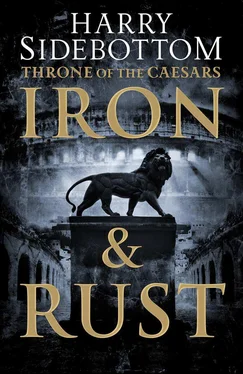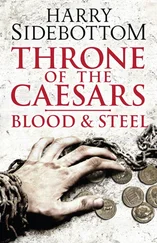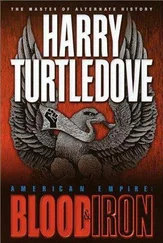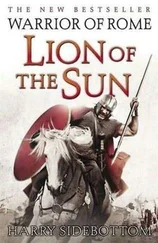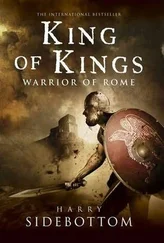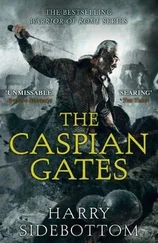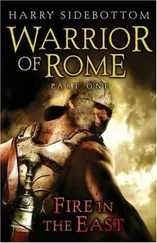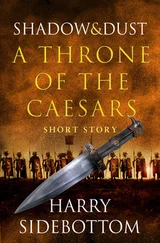Harry Sidebottom - Iron and Rust
Здесь есть возможность читать онлайн «Harry Sidebottom - Iron and Rust» — ознакомительный отрывок электронной книги совершенно бесплатно, а после прочтения отрывка купить полную версию. В некоторых случаях можно слушать аудио, скачать через торрент в формате fb2 и присутствует краткое содержание. Год выпуска: 2014, Издательство: HarperCollins Publishers, Жанр: Исторические приключения, на английском языке. Описание произведения, (предисловие) а так же отзывы посетителей доступны на портале библиотеки ЛибКат.
- Название:Iron and Rust
- Автор:
- Издательство:HarperCollins Publishers
- Жанр:
- Год:2014
- ISBN:нет данных
- Рейтинг книги:4 / 5. Голосов: 1
-
Избранное:Добавить в избранное
- Отзывы:
-
Ваша оценка:
- 80
- 1
- 2
- 3
- 4
- 5
Iron and Rust: краткое содержание, описание и аннотация
Предлагаем к чтению аннотацию, описание, краткое содержание или предисловие (зависит от того, что написал сам автор книги «Iron and Rust»). Если вы не нашли необходимую информацию о книге — напишите в комментариях, мы постараемся отыскать её.
Iron and Rust — читать онлайн ознакомительный отрывок
Ниже представлен текст книги, разбитый по страницам. Система сохранения места последней прочитанной страницы, позволяет с удобством читать онлайн бесплатно книгу «Iron and Rust», без необходимости каждый раз заново искать на чём Вы остановились. Поставьте закладку, и сможете в любой момент перейти на страницу, на которой закончили чтение.
Интервал:
Закладка:
A pig was brought in, and sacrificed. The attendants slit its belly and drew out its innards. As auspex , the Emperor lifted the slippery things and inspected them. He announced them propitious and said a brief prayer.
Maximinus stood, his hands dripping blood, as he waited for a bowl and towels. He was enormous; very ugly. His expression was closed, brutal. Perhaps it was to be expected. His wife had been murdered. By all accounts, Caecilia Paulina had been a gentle woman, kind-hearted. Maximinus would feel her loss, and he lacked the education which might have offered some consolations. Self-control could not be expected from a half-barbarian herdsman.
Iunia Fadilla thanked the gods for the slowness of her journey. If her carriage had not shed a wheel, if Eunomia had not prayed at every wayside shrine, she might have been in Viminacium when the revolt broke out. Her corpse might have joined that of Caecilia Paulina in the street. Perhaps Gordian had been wrong. The gods might not be far away and uncaring. Perhaps piety occasionally was rewarded.
Flavia Latroniana took Iunia Fadilla’s hand and placed it in that of Maximus.
‘ Ubi tu Gaius, ego Gaia .’ Iunia Fadilla spoke the traditional words. She had no more idea of their meaning than anyone present.
The bride and groom sat on chairs covered with the fleece of a freshly slaughtered sheep and nibbled a morsel of spelt cake. In solemn silence, ten witnesses signed the wedding document. Lucius was the only representative of her family to do so.
The thing was done.
‘Feliciter!’ The assembled party shouted their blessings. ‘Good fortune!’
In view of the lateness of the season — in Rome, the October horse would have been slaughtered two days before — and the northerly latitude, the couches of the wedding feast had been spread in the rooms opening on to the atrium. Braziers had been lit to keep the chill at bay.
In the chamber of honour, in the presence of the Emperor, the celebrations were muted. Maximinus ate vast quantities of roast meat, drank unfeasible amounts of wine. It did nothing to lighten his mood. Under his baleful gaze, even the self-assurance of his son seemed to wither. Several times Iunia Fadilla found that the Emperor was staring at Maximus and herself. There was an intensity in his look she found frightening. In his savage grief, did he resent their felicity? Her stirring of compassion gave way to anxiety. An Emperor was above the law. Nummius had told her of a wedding he had attended in the reign of Elagabalus. The bride had been attractive. Elagabalus had led her from the room. Half an hour later, he had brought her back, dishevelled, crying. The Emperor had assured her husband that he would enjoy her.
Abruptly, Maximinus announced that he needed to relieve himself. As soon as he was gone, conversation became more animated. As Catius Clemens regaled the others with an anecdote from the Dacian campaign, Maximus leant close to Iunia Fadilla. He smelt of cinnamon and roses, and he was very attractive.
‘I had imagined,’ he said, ‘my wife would be a virgin, not soiled. They say you have sucked off half the men in Rome. At least you should be good at it.’
CHAPTER 27
The Northern Frontier
The Town of Sirmium,
Two Days after the Ides of October, AD236
‘ Talassio! ’ the crowd shouted. ‘ Talassio! ’ They did not know what it meant. It was what you shouted at a wedding procession.
‘ Talassio! Talassio! ’
Maximinus followed the bridal couple. A page walked on either side of Iunia Fadilla, holding her hands. For a woman who had been married before, she looked oddly apprehensive. Rather than stay by her side, Maximus went ahead with the page who carried the nuptial torch. The young Caesar threw nuts to the crowd, answering their ribald comments, revelling in their admiration.
How could the boy be so happy, just months after the death of his mother? Maximinus stopped himself from grinding his teeth. He could not imagine smiling. Everyone had been taken from him. He thought of the forest in Germany, of the spear thrusting into Micca’s back. For forty years, Micca had guarded him. After the massacre at Ovile, he had been one of the first to join his band. Together, they had hunted the high hills of Thrace, and along the banks of the Danube, bringing wild justice and retribution to brigands and barbarian raiders. When Septimius Severus had enrolled Maximinus in the army, Micca had accompanied him as a servant. Micca had been at his side in Dacia, Caledonia and Africa — wherever he was posted across the imperium . Tynchanius had been with him even longer. He had been an older neighbour; his family had died in the hut next to the one in which Maximinus had found his father, mother, brother and sisters. Tynchanius had shared his hatred for the northern tribes. Maximinus could not remember a time before Tynchanius. And now, like Micca, he was gone.
Yet the loss of them paled beside that of Paulina. It was twenty-two years since they had walked, in a far smaller procession, to his rented apartment in Rome. Returned from Caracalla’s campaign against the Alamanni, newly raised to the equestrian order, he had been favoured by the Emperor. Yet he had sensed the doubts of Paulina’s parents. They had been wrong. The marriage had been happy. Even in the reign of the perverted Elagabalus, when Maximinus had retired to the estate he had bought outside Ovile, Paulina had stood by him.
Now she was dead, and it was his fault. If he had not become Emperor, she would not have died. He had not wanted the purple. It had been forced upon him. She had been brave, but she had seen it would end in tragedy. If he had found a way to avoid the fatal throne, she would be alive. Paulina, Tynchanius, Micca: they were all dead, and it was his fault.
‘ Talassio! ’ The shouts gave way to a song of the joys of the wedding bed; the groom would conquer his bride in the heated wrestling, the god Hymen would preside.
Maximinus did not pretend to join the merriment. In the guttering torchlight, he considered the throng: the flute players, the couple and their pages, the guests and Iunia’s maids. Two of the latter carried a spindle and distaff. They were about all Iunia Fadilla had brought to the wedding.
Maximinus had never wanted to be Emperor, but when you have a wolf by the ears you can never let go. Honoratus and the others in his consilium had assured him that this marriage would reconcile the descendants of Marcus Aurelius and the nobility to his rule. It seemed they were wrong. The only relatives of the bride in attendance were one Lucius Iunius Fadillus, an equestrian cousin, and a more distant kinsman, Clodius Pompeianus, an ex-Quaestor of dubious reputation. Apart from them, a second cousin of her first husband had dared to appear, letting ambition triumph over propriety. This Marcus Nummius Tuscus might think himself fortunate merely to have been sent away. The reprieve might not be permanent.
Paulina had been right. The good and the great of Rome would never accept him as their Emperor. No Emperor had ever stepped down from the throne. Maximinus had asked Aspines. The nearest parallel the sophist could find was the Dictator Sulla renouncing his powers. But that was long ago, and the divine Julius Caesar had said it proved Sulla had no understanding of politics. If disease had not carried off Sulla soon afterwards, would the safety of his retirement have been certain?
Self-preservation was joined to duty. Unlike the Senate, Maximinus understood duty. He had served Rome all his life. While he sat the throne, he would continue to serve. The safety of Rome depended on defeating the northern tribes. Everything must give way to the war. Dacia was restored, and Honoratus had held the Goths on the lower Danube. Over the winter, Maximinus would raise more troops, more money. Early in the new year, he would pursue the nomad Sarmatians out on to the great plains. Once he had defeated them, driven off their herds, he could turn again to Germania, and the advance to the Ocean.
Читать дальшеИнтервал:
Закладка:
Похожие книги на «Iron and Rust»
Представляем Вашему вниманию похожие книги на «Iron and Rust» списком для выбора. Мы отобрали схожую по названию и смыслу литературу в надежде предоставить читателям больше вариантов отыскать новые, интересные, ещё непрочитанные произведения.
Обсуждение, отзывы о книге «Iron and Rust» и просто собственные мнения читателей. Оставьте ваши комментарии, напишите, что Вы думаете о произведении, его смысле или главных героях. Укажите что конкретно понравилось, а что нет, и почему Вы так считаете.
